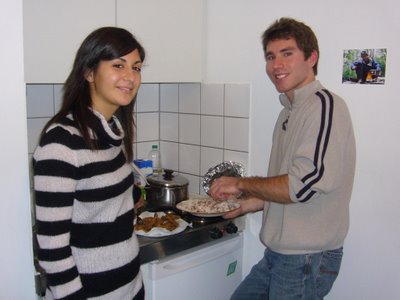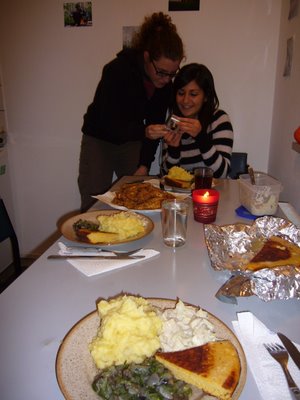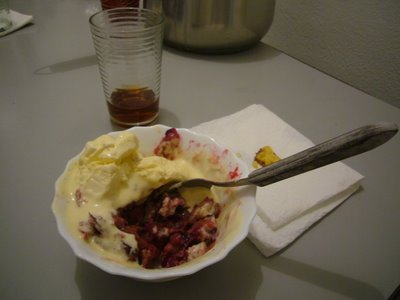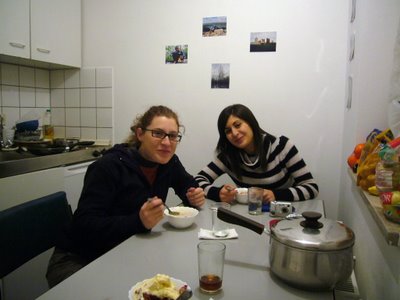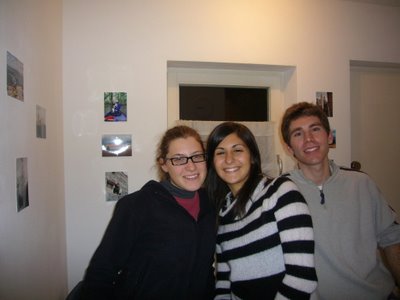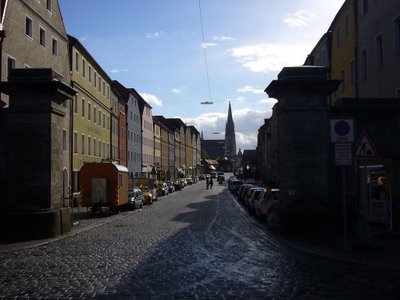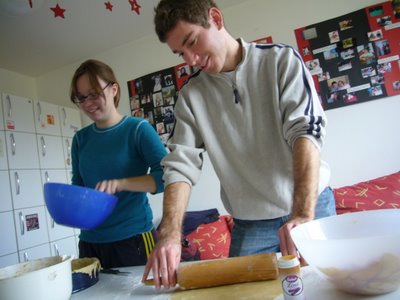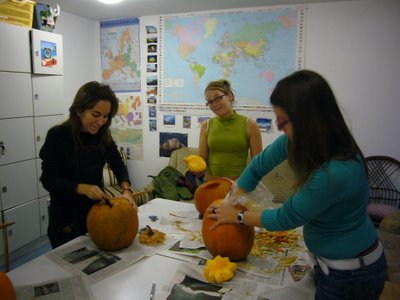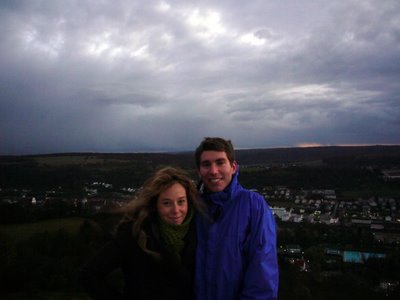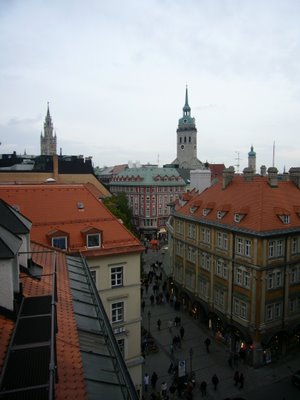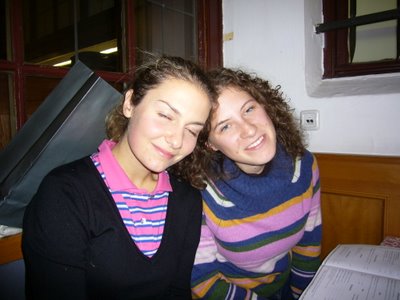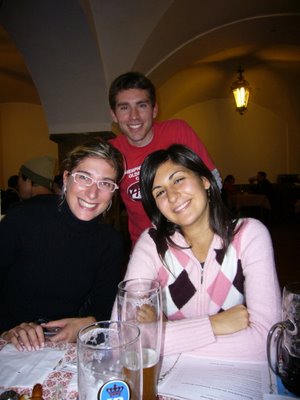In light of the recent elections I believe now might be an appropriate time to deliver a post on the interesting and sometimes politically heavy issue of America’s influence on Europe, and the resulting European image and opinions of America. This is of course a complex issue, and I by no means contend that this one post covers it to the fullest extent. Nonetheless, I feel that in one and half months I have heard enough opinions and made enough observations regarding this issue to present an intriguing overview. While many more categories and subcategories exist, one can divide Europe’s thoughts of the US and the US’s influence on Europe into five broad elements of the American culture: language, music, food, film and television, and politics.
The World’s Language
One of the largest surprises I had upon arriving in Germany was the amount of English one sees and hears in everyday life.
The simplicity of the English language probably plays part of a role in its widespread usage and knowledge. For example, unlike other languages I have encountered, English nouns have no genders attached to them. English speakers need not worry about adjective endings. One foreigner I spoke with also believes that because of the many English words with multiple meanings, one must not learn as large of a vocabulary as with other languages. In the end though, I believe that the relatively high amount of English one finds in Germany and around the world stems mainly from the influence of America’s economy and culture.
When it comes to everyday life here, English plays its own small role. Germans buy “CallYa” plans for their “Handys” (cell phones). When traveling across the country or to the city center they may ride the “InterCityExpress.” Perhaps if they want a snack for the train ride they’ll buy something from a café and ask for it “To-Go.”
The majority of the college students I have met know at least a limited amount of English. I know that many conversations would go smoother and quicker if I myself spoke in English, but seeing as how I am in Germany, and the other foreign students are here to learn German themselves, it does not seem appropriate nor respectful. Some of the Europeans I have spoken with have been learning English since grade school, and they speak English almost as well as native speakers. Of course I have also met those college students who speak no English, but my experience so far tells me they are a minority.
However, one finds fewer English speakers in the older generations. Coming from a time of pre-globalization these generations probably never received the pressure in school to learn English as the youth of today’s Europe.
Before arriving here I knew that many Europeans, perhaps most of Europe’s younger generations, can speak more than one language. I knew this ability was necessary due to the density of nations on the European continent, but I also believed that the Europeans chose to learn other languages out of respect for their neighbors. Indeed, some learn other languages for this latter reason as well; however, most students I have spoken with learn another language only out of necessity or usefulness. The multitude of languages in Europe frustrates these students.
When the topic of English comes up in conversations I often hear the same view directed towards me stated in a slightly different way. Basically it’s something to the effect of the following:
“You’re lucky, English is your native tongue. You speak the world’s language. You can go anywhere in the world and get by without any problem. We have no choice, we must learn English and other languages because we live in Europe.”
I have been told by many Europeans that they expect visiting Americans to only speak English; therefore, it pleasantly surprises them to meet an American who speaks a foreign language. They know that I as an American have no significant reason to learn another language, and they greatly appreciate the fact that I take the time to learn and speak one.
Later in these conversations about English, I usually state that I dislike the prevalence of the language around the globe. I pause and wait for the weird looks I receive every time without failure, then elaborate. I share with them my opinion that it damages the local culture when the people of that culture must learn English in order to succeed in the modern global economy. Language exists as an important attribute to any culture, and if the people replace their language, will they also replace their culture? Without their traditional culture would they lose their identity, and how would they distinguish themselves from others on the Earth? Then my audience understands and usually agrees that this scenario is a potential consequence. However, some know this not merely as a potential but a reality already occurring, as with Federica’s example.
Federica comes from Italy, more specifically a small town in the area of Milan. She explained to me that there are really multiple regional Italian dialects, each distinct in its own way. In the past children would learn the dialects from growing up in the region, but today more of the youth learn, along with the required two foreign languages in school, standard Italian and not their respective regional dialect. Federica is fortunate, because she has regular contact with her grandmother, and therefore the chance to learn the older dialect. However, the number of those from the older generations who still speak the dialects naturally decreases everyday, and so one hears the regional dialects less and less.
Imagine traveling to Wisconsin, Louisiana, or New Jersey and not hearing the unique accents and words of those states. The South simply wouldn’t be the South without hearing “ya’ll” in conversations.
Live from AmericaThe level of American songs on the radio continues to surprise me. It is no exaggeration when I say that the radio stations here play songs in English more often than in German. One also hears French and Spanish music, but English unquestionably dominates the air waves. The other Europeans tell me it’s the same in their homelands, such as Italy, France, or Spain. They are always almost shocked to hear that American radio stations, excluding those specializing in foreign genres, play mostly American music and essentially only music in English.
Many of the students offer the reason that English is the best language for singing, due to its flow and rhyming ease. Therefore, simply more English music exists than say German or Italian.
Many of the Europeans I have spoken with love American music, and it is not uncommon for them to own CDs from the Red Hot Chilli Peppers, Green Day, or Madonna, to name some examples. They may not understand all the lyrics, but they know the refrains and tunes by heart. Even in bars and at parties American music is pumped over the speakers. All types of American music too, from the Sixties to today, and from pop to punk.
The Europeans with whom I have spoken offer few complaints about American music. In fact the only one to date comes from Vallaria, who hails from Italy. For some reason the music of Johnny Cash does not agree with her. Then again, this could be a simple timing issue. She told me this in the Theke, a few minutes after a full house showing of Walk the Line had ended.
Ronald and Colonel Sanders
Unfortunate as it is, most of the Europeans I have spoken with view fast food as American cuisine. Many of the same fast food chains as in America operate in Europe. The local McDonald’s is only a three minute walk away from my apartment. I have yet to see any in Germany, but apparently KFCs are very popular across the rest of Europe. Even Taco Bell exists across the pond. A Swedish girl told me that there is a chain of restaurants in her country by the name of Memphis. Supposedly it serves Southern food, but I tend to doubt this claim due to the fact that cheeseburgers are one the menu.
The opinions toward American food are usually positive, but not always so for the food companies. Let’s take the example of McDonald’s in Illania’s hometown of Brindisi, Italy. From my understanding Brindisi is a small Italian city along the coast of the Adriatic Sea. According to Illania, a number of years ago a McDonald’s opened up in town against the residents’ wishes. They looked at it as a symbol of America invading their home and wanted nothing to do with it. The residents boycotted the restaurant and it closed after a few months of business.
I have heard the same sentiment from others, that they have no desire for American fast food restaurants in their cities and towns. However, I’m not sure if I believe this, because if that were true why have I not heard the story of other failed fast food ventures like the McDonald’s in Brindisi? In my opinion, American fast food businesses remain alive and well in Europe.
I also see American foods in the grocery store, but not in any shocking amounts. There is a German food brand that produces American style items like bread, hot dog buns, and chocolate chip cookies. The name of this brand is Tennessee: American Style. In the freezer section I see bags of frozen wienerschnitzel lying next to bags of frozen buffalo wings.
The good news is that many of those with whom I have spoken acknowledge that more American cuisine must exist than fast food cheeseburgers and fried chicken, but they don’t always know what.
HollyvoodI’ve already talked about how the Europeans love American music, but it’s possible they might even enjoy our television shows and movies more.
As with music, many of the same popular television shows of America play in Europe as well. To run down a short list of series, Europe has among others
Stargate SG-1,
Sex and the City,
Friends,
Gilmore Girls,
Family Guy,
The Simpsons,
CSI, and
Twenty-Four. Most of these shows appear in the prime time hours on the local television stations dubbed in German. Unlike with the radio, I would say that German series and programs outnumber those from America.
Though the European countries may produce many of their own television series, it appears that many of the people prefer the American ones. Ellena’s favorite shows to watch while at home in Spain are Friends and
Sex and the City; however, in Spain the latter goes by the name
Sex and New York. It seems that
The Simpsons is popular in many European countries, but especially in Germany. I can’t explain why, but a lot of Germans love this show. To give an example of how much, a family down the street from my apartment building has a painted wooden cut out of
The Simpsons' characters propped up in their front yard.
The same pattern follows suit with movies. Many of the same movies playing in America will play during the same period in Germany. Others will debut in Germany a little later than in America. Often the movies are dubbed in German, or German subtitles appear at the bottom of the screen. I have heard from a German that all movies in Sweden are in English with Swedish subtitles. Sometimes the original title for the movie may change completely, other times it is translated into the local language, and still other times the original English title remains. Somewhat unfortunately, it seems that the American movies with serious themes do not cross the Atlantic as much as the comedies and action dramas.
Hollywood celebrities reach nearly the same level of fame here as in America. The German tabloids cover the same stories as their American counterparts, but also with some added coverage on European or German stars. Last Thursday’s edition of Eichstaett’s newspaper reported that George Clooney was voted Sexiest Man Alive for the year by
People magazine.
As for one of Europe’s impressions of Americans, I have been asked more than once if we really spend so much of our time in front of TVs and in movie theaters. Usually an image of the giant television in my home comes to mind, then I answer that many Americans do fit this impression, but many others do not.
The Stain of PoliticsThe most common questions I receive here are, “What is your name?,” “Where are you from?,” and “What do you think about President Bush?” The first few times I was asked about my opinions on the President I took it light-heartedly and thought nothing on it. However, it has occurred with such frequency that I now view this question as an annoyance. It probably comes as no shocking news that many, if not most, Europeans disfavor the President and American politics.
The politics of America play an important role across Europe. Two weeks ago the local radio stations were giving updates every hour on the election in America. There was even a sound clip that was broadcasted every now and then that explained how the election process works in America and what were the potential outcomes and consequences of this specific election. The station DJ, as others I spoke with, did not hesitate to state his hopes that the election would bring positive change. The Europeans are angry over the Iraq War, displeased with America’s stance on global warming, and frustrated with the issue of oil, so essentially many of the same debates that take place in America.
It was very interesting for me to hear Illania’s point-of-view on the Iraq War, an especially personal issue for her. Apparently her brother is currently stationed in Iraq with the small Italian contingent. In her opinion this war should not concern Italy, and she believes that Italy’s leaders wish only to appease those of America by providing some military support. When asked what she would like to change, she answered that Italy and other European countries must act to please America, but should instead possess the ability to act freely. When I reminded her that Spain acted freely when it removed its troops from Iraq shortly after the Madrid bombings she responded, simply, that it wouldn’t be so easy for Italy.
As with everything, exceptions exist to this European anti-American sentiment, in this case it goes by the name of Alexi. Alexi, believe it or not, comes from France, but he wishes it weren’t so. Alexi “hates” his home country. He studies politics, and his dream is to some day work with a think tank in Washington D.C. He also happens to think highly of President Bush. Alexi is, as one might expect, a minority here and in France.
In the end, not all is bad for Americans visiting Europe. Stephan, a twenty-two year old German student, took the time to ensure me that Europeans do not dislike Americans, rather American politics and leaders. They recognize a clear distinction between the two. Meeting an American who can correctly name the capitals of European countries encourages him that not all Americans are so ignorant to things outside of the US, as he previously believed. I also wish to make it clear that I have never been made a target of anti-Americanism, nor any other from of persecution because of my American origins. Each debate or conversation about America has been friendly and on good terms. There are also those European friends of mine who have never asked me about American politics or the President; therefore, I believe not all Europeans concern themselves with it as much as others, or perhaps my friends simply don’t wish to bring further annoyance to me.
Some More of My Thoughts
For one thing, I believe it is easy for those not in power to criticize and complain. Of course Illania should feel like Italy needs the ability to act freely. I agree with her that the countries of Europe must consider how their actions will effect their relationship with America due to our position as the world’s superpower. However, how would Italy act differently were it in America’s position? Would it not take similar steps to ensure the prosperity of its citizens?
My observations here motivate me to say that perhaps Europe’s anti-American sentiments rise from America’s constant knock on the European front door. As I have discussed, Europeans eat our food, listen to our music, watch our actors and actresses, wear our clothes, and learn our language, all sometimes involuntarily. I believe I would also become annoyed if German restaurant chains popped up around Memphis, German music replaced American music on the radio, I watched television shows that were always set in Berlin or Munich, and German words replaced the English in advertisements. I believe I too would feel like my culture was under assault. However, this theory must be flawed, for all of these elements are, most of the time, matters of choice. If Europeans were truly against America why would they continue to support our food, music, media, and clothing companies? Why haven’t more elements of the American culture in Europe gone the way of the McDonald’s in Brindisi? Perhaps the distinction between American culture and American politics really is this strong. Europe still enjoys bitting into a McDonald’s cheeseburger every so often, but our politics leave a bad taste in their mouths.
I posed these questions to Florian, a German student. Specifically, why do so many Europeans claim to dislike America while they continue to prefer elements of its culture over their own? To paraphrase his answer, there is no cultural clash because Germans and other Europeans do not view American music, food, television, etc. as American, rather they view as part of their own culture. For example, they do not consciously set Red Hot Chilli Peppers or
Friends apart as American. At the time this answer sufficed for me, I understood what Florian meant. However, now in retrospect I see a completely different meaning. If Florian’s statements are true, if the European youth really observe the elements of American culture as their own, then perhaps America’s culture has already permanently imprinted itself on Europe.
However, if this is the case, then perhaps it is not so bad as I would have thought. History shows that cultures have always been shaped by foreign influences, and that they adapt and evolve over time. America is quite possibly the perfect case in point. The present American culture is a mix of dozens of nationalities and cultures from all around the globe that became intertwined and blended together, everyone should remember from school the symbol of the melting pot. I only hope that in the faster paced world of the twenty-first century no culture completely loses itself in the whirl of American and other foreign influence.
